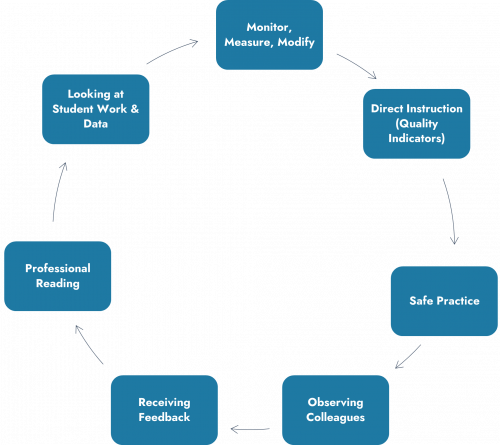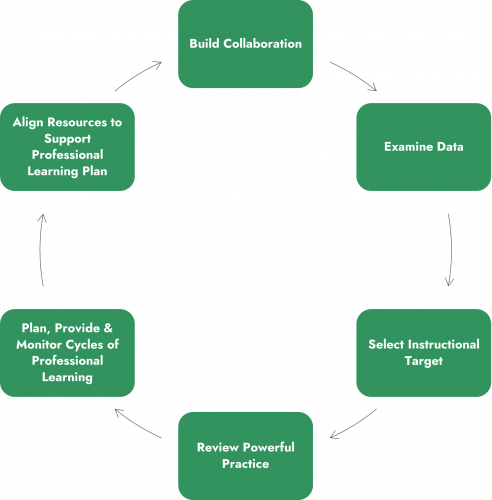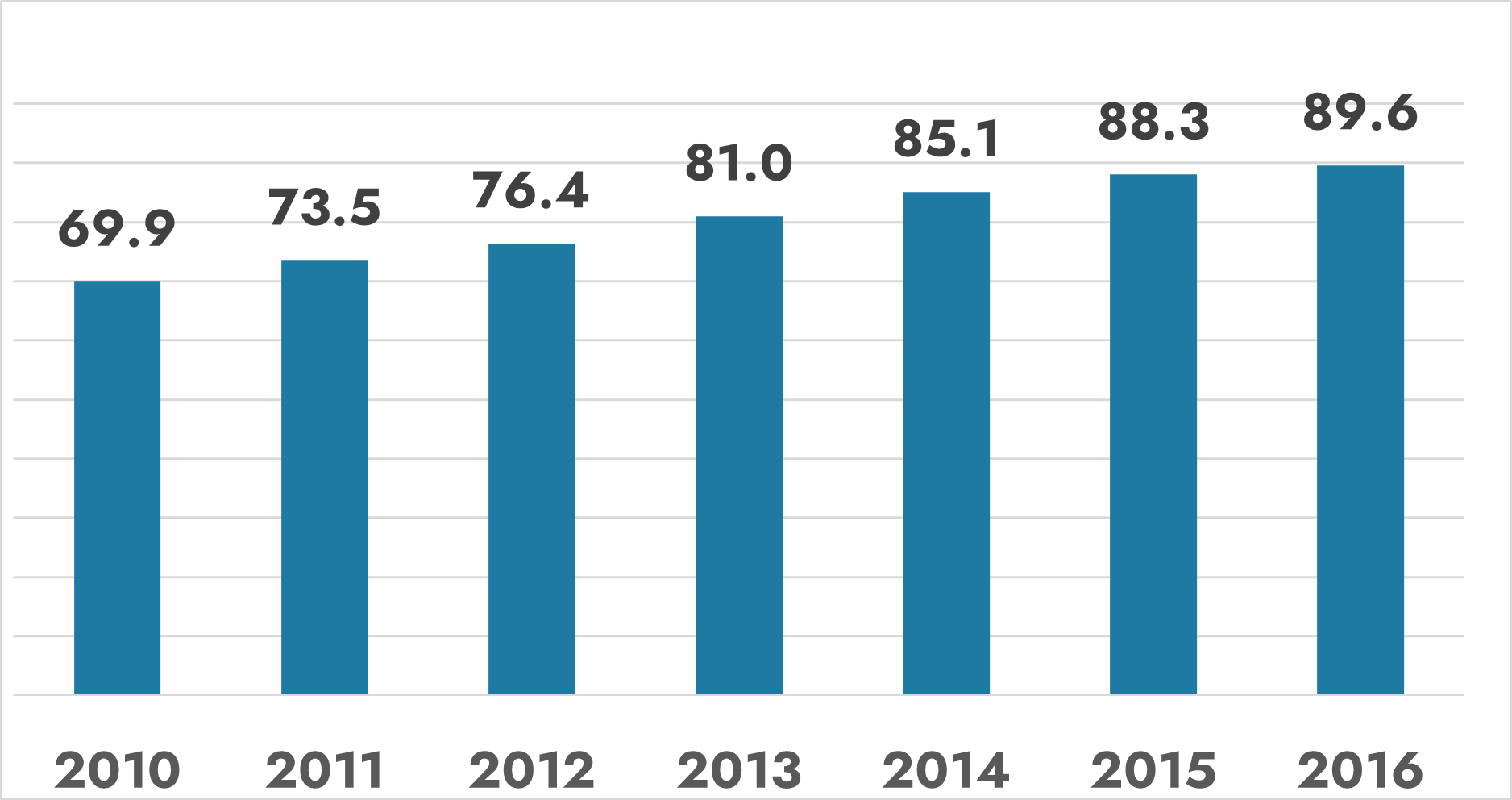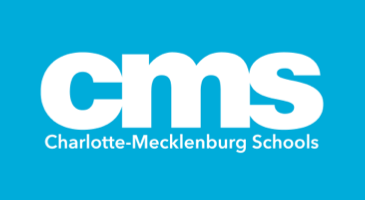Overview
In 2014 Charlotte-Mecklenburg Schools (CMS) — the nation’s 16th largest school system — embarked on a multi-year, district-wide implementation of Reading Apprenticeship. Several years later CMS saw its high school graduation rate rise by nearly 20%. Literacy has been a key factor in this remarkable improvement.
Challenges
- Improve students’ literacy performance across the district
- Raise graduation rates district-wide
- Identify a comprehensive approach that would work at scale for sustainable impact on teacher practice and overall student achievement
- Sustain and build on initial success from implementing Reading Apprenticeship with continued teacher professional learning and teacher leadership teams
A trusted approach to building student success: Reading Apprenticeship is a model of teacher professional learning that helps teachers shift their practice in ways that result in deeper student learning, achievement, and engagement. It integrates four dimensions of learning—social, personal, cognitive, and knowledge-building—and ties them all together with metacognitive conversation. Students and teachers learn text-based inquiry and collaboration routines which help create safe classroom environments and establish cultures of positive learning.
Implementation of Reading Apprenticeship:
A literacy professional learning solution with lasting impact
In 2011 CMS leaders identified student literacy achievement as a keystone to district-wide improvement and charged Rebecca Graf, CMS’ Director of Secondary Literacy at the time, with improving student literacy performance across the district. Graf and other CMS leaders wanted an instructional approach focused on both disciplinary literacy and social emotional learning, and one that had a solid evidence base. They began the process of investigating the best programs to achieve these goals. Once CMS determined that Reading Apprenticeship was a match for their district, they embarked on a multi-year, phased plan to implement the Reading Apprenticeship model.
Building literacy focused leadership & coherence
After sending a lead team to participate in Reading Apprenticeship professional learning, and consulting with our leadership, CMS kicked off their literacy effort in 2014 by convening secondary school principals and district leaders to participate in a three-day professional learning experience to see if they thought the approach was a match for their schools’ needs and professional learning goals. They also took several teams to Michigan to see Reading Apprenticeship in action at Fordson High School, which is a model school for school-wide, long-term Reading Apprenticeship implementation.
For a district our size to go to scale, it is difficult. I know I’m never going to reach every teacher through the training, but I can be very deliberate and have a core group with this knowledge. We can reach every teacher with a few key routines and an adjusted mindset. The entire building now has a common language that they are using to approach text.”
— Rebecca Graf, Director of Secondary Literacy
Charlotte-Mecklenburg Schools
Following the initial Reading Apprenticeship professional learning sessions, CMS began integrating Reading Apprenticeship into their instructional planning via leadership teams by establishing cross-role Instructional Leadership Teams (ILT). Teams from every school attended six ILT workshops in which they planned how they would carry the literacy work back into their particular school culture. “We were frontloading our instructional leadership teams with this [Reading Apprenticeship] framework,” Graf says.
CMS’ Instructional Leadership Teams – Cycles of Professional Learning:

The ILTs are built on a learning and implementation cycle that helps schools embed Reading Apprenticeship in ways that would work for them. As part of the improvement cycle, all teachers learn about a specific instructional practice, such as thinking aloud, in which students work as partners to identify clues to the meaning of the text they are working with and share their emerging understandings and questions.
Then there is a safe practice phase in which teachers can try the routines and share their experiences with the other members of their professional learning communities. Finally, as they open up their practice, teachers learn from concrete observation and exchange. The ILT members might observe the classroom environment, with no teachers or students in the room, to look for evidence of the practice, for example. This process can also include structured school-to-school visits where established instructional leadership team can support capacity-building and best practices with newer teams.
CMS’ Cycle of Improvement:

Multiple studies show that Reading Apprenticeship produces:
- Standardized test scores over a year ahead of control students
- Significant impact on students’ reading comprehension scores – up to 63% improvement
- Substantial improvement in students’ grade point average in core academic classes
- Positive shifts in students’ identities as readers, problem-solvers and independent learners
- Statistically significant impact on student literacy in science classes
Results:
Motivated teachers engage students in deeper learning for improved outcomes
Michael Miliote, the principal at CMS Robinson Middle School, says he sees a difference in teachers’ response to Reading Apprenticeship compared to past approaches the district has implemented. “There wasn’t a whole lot of pushback,” he says, adding that more seasoned teachers blend the routines into practices they are already using, while newer teachers find that the model gives them purpose and direction.
Teachers, he says, are seeing growth in students’ level of critique and their ability to have strong academic conversations. And that’s the whole point of Reading Apprenticeship—that students will learn about themselves as readers and gain confidence in using their skills and knowledge to persevere with material they might have given up on in the past.
This perseverance has translated into tangible improvement in outcomes for CMS students with marked increases in engagement, literacy levels, and overall academic performance. Since the systemic implementation of Reading Apprenticeship and other initiatives across, CMS has seen an impressive 20% rise in graduation rates.
Districtwide Impact: Charlotte Mecklenburg Schools – 20% Increase in Graduation Rate

During this same period, CMS exceeded student growth expectations of the state and outperformed other large districts in North Carolina.
CMS Outperformed State of NC & Other Large NC Districts
Percent of schools exceeding expected growth:

At Myers Park High School, Principal Mark Bosco says Reading Apprenticeship gives him a new perspective on students when they walk across the stage at graduation. “You know they have a skill set. They can read, write, listen and speak,” he says. “What these kids are graduating with is relevant to the world.”
For more information about Reading Apprenticeship, contact Sharon Sáez at 310-997-1891 or [email protected], or visit readingapprenticeship.org

